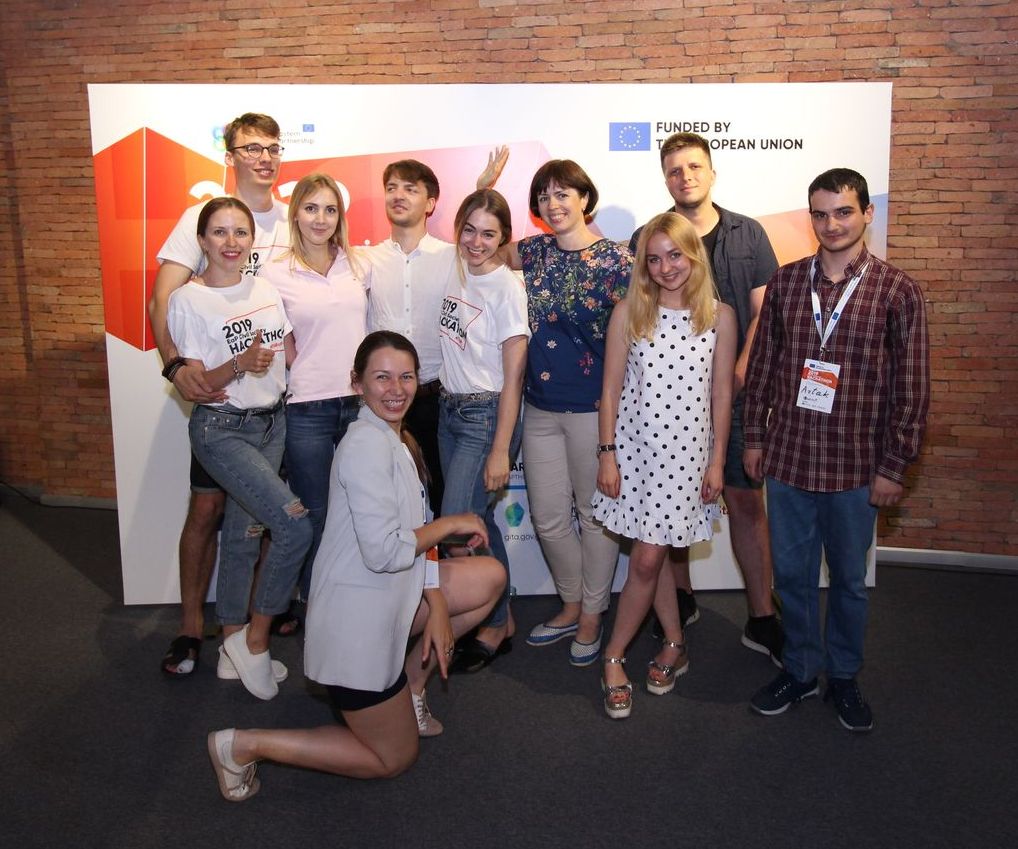
Digital solutions for cleaner environment, better health and accessibility for all – these were the three ideas nominated for the EU Digitalisation for Civil Society Award by the participants and mentors of the 2019 EaP Civil Society Hackathon.
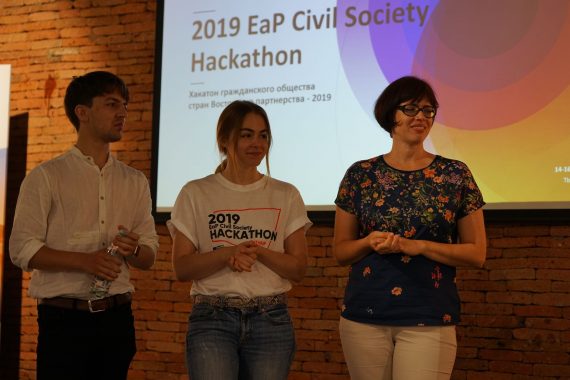 Olga Tereshchenko from Odesa (Ukraine) came to the Hackathon with the idea of a tool that would collect complete and verified data on gluten-free drugs, products and services. According to the World Health Organisation, up to 10% of European population face some health problems associated with gluten consumption with 1% of them suffering from celiac disease. While both groups need a gluten-free diet, the latter has to adhere to the most rigorous diet type for the entire life – in Olga’s own words, ‘even three breadcrumbs can be life-threatening.’ In Ukraine, there are 420,000 people with severe gluten allergy, many of them have no idea about their condition until it is too late. At the same time, there is no single information resource available in Ukraine where verified, reliable and relevant gluten-related information could be obtained.
Olga Tereshchenko from Odesa (Ukraine) came to the Hackathon with the idea of a tool that would collect complete and verified data on gluten-free drugs, products and services. According to the World Health Organisation, up to 10% of European population face some health problems associated with gluten consumption with 1% of them suffering from celiac disease. While both groups need a gluten-free diet, the latter has to adhere to the most rigorous diet type for the entire life – in Olga’s own words, ‘even three breadcrumbs can be life-threatening.’ In Ukraine, there are 420,000 people with severe gluten allergy, many of them have no idea about their condition until it is too late. At the same time, there is no single information resource available in Ukraine where verified, reliable and relevant gluten-related information could be obtained.
Olga Tereshchenko, “Our team worked hard for these three days and we managed to create a concept of our tool, GLUTEN FREE ASSISTANT, a web portal with multiple modules for collecting information about food and drugs, adding verified data and user reviews and forming a gluten-free community”.
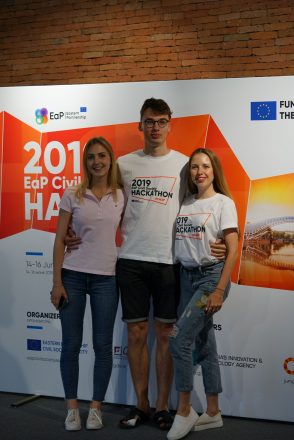 Anna Krys, our second nominee from Ukraine, is concerned about accessibility infrastructure for people with disabilities and the lack of information for such individuals about opportunities they could use to enjoy life to its fullest. The current level of accessibility solutions in Ukraine effectively excludes individuals with disabilities from social life and political processes happening in the country. “In Ukraine, 90% of ramps are installed incorrectly and, in general, the infrastructure is not intended for people with limited mobility at all,” says Anna. To address the challenge, she came up with the idea of PROVODNIK, an interactive map for people with special needs to help them find best and safest routes, enjoy more active lifestyle and ultimately, spur development of inclusive urban infrastructure. The map will also allow users to mark locations without necessary inclusive infrastructures, rate accessibility of places and send in automatic requests (problem reports) to government bodies to solve the problem.
Anna Krys, our second nominee from Ukraine, is concerned about accessibility infrastructure for people with disabilities and the lack of information for such individuals about opportunities they could use to enjoy life to its fullest. The current level of accessibility solutions in Ukraine effectively excludes individuals with disabilities from social life and political processes happening in the country. “In Ukraine, 90% of ramps are installed incorrectly and, in general, the infrastructure is not intended for people with limited mobility at all,” says Anna. To address the challenge, she came up with the idea of PROVODNIK, an interactive map for people with special needs to help them find best and safest routes, enjoy more active lifestyle and ultimately, spur development of inclusive urban infrastructure. The map will also allow users to mark locations without necessary inclusive infrastructures, rate accessibility of places and send in automatic requests (problem reports) to government bodies to solve the problem.
For Anna, the Hackathon was a necessary exercise with valuable insights and take-home suggestions: «These were three amazing days! My project has changed a lot during this time, I tried to hear each of you and apply all your recommendations. Thank you very much to my hack team, mentors and organizers of the Hackathon for the opportunity to make our society better. We still have a very long way ahead!”
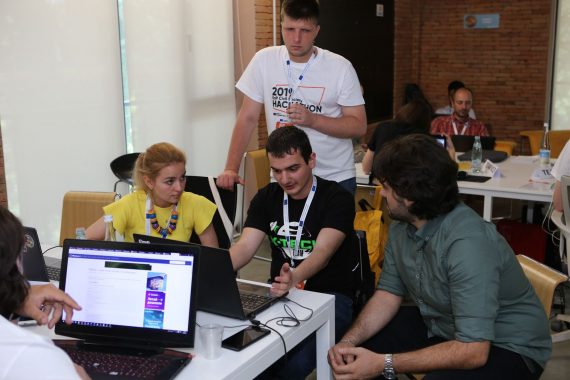 The problem of separate waste collection is rather relevant for all Eastern Partnership countries and, not least of all them, Belarus. Seeing the problem as a matter of education, Polina Pliskovskaya from Minsk (Belarus) is trying to solve it with RUBBISH, an online game to teach children how to care about the environment and responsibly deal with garbage sorting. A survey carried out in Minsk revealed three main problems: lack of motivation to separate waste collection; lack of awareness; and poorly developed urban infrastructure. “On top of that, there is a big problem with municipal dump sites overfilling, which only makes the question of building a ‘culture’ of separate waste collection, especially among children, even more so important,” Polina says. “I personally really care about ecology and waste recycling, but unfortunately not everyone is like me. That’s why we decided to create an educational game app where kids and adults could learn how to do waste sorting – and be motivated for it! Our Monster Rubbish is hungry and gloomy, he is waiting for somebody to feed him garbage by making check-in near the trash box…help us to let the monster go out from the rubbish bin!”
The problem of separate waste collection is rather relevant for all Eastern Partnership countries and, not least of all them, Belarus. Seeing the problem as a matter of education, Polina Pliskovskaya from Minsk (Belarus) is trying to solve it with RUBBISH, an online game to teach children how to care about the environment and responsibly deal with garbage sorting. A survey carried out in Minsk revealed three main problems: lack of motivation to separate waste collection; lack of awareness; and poorly developed urban infrastructure. “On top of that, there is a big problem with municipal dump sites overfilling, which only makes the question of building a ‘culture’ of separate waste collection, especially among children, even more so important,” Polina says. “I personally really care about ecology and waste recycling, but unfortunately not everyone is like me. That’s why we decided to create an educational game app where kids and adults could learn how to do waste sorting – and be motivated for it! Our Monster Rubbish is hungry and gloomy, he is waiting for somebody to feed him garbage by making check-in near the trash box…help us to let the monster go out from the rubbish bin!”
One of these three projects will get the EU support to be fully developed and launched. The winner will be announced in July 2019.
Background information:
The 2019 EaP Civil Society Hackathon is the third hackathon in a series of annual events by the EU-funded “Eastern Partnership Civil Society Facility” project. This year the Hackathon was held in Tbilisi on 14-16 June in partnership with the Georgian Innovation and Technology Agency. Over 70 civil society activists, designers and IT experts from Belarus, Armenia, Azerbaijan, Georgia, Moldova and Ukraine will gathered in Tbilisi for three days to create digital tools to enable civil society organisations and activists better serve the needs
of their communities and help citizens participate in decision making processes in their countries. Participants worked on 20 project ideas to design and create web and mobile applications for healthy life, e-transparency services, educational online games for kids, crypto currency online platforms, websites for analysis of open data, interactive maps for communities’ needs, crowdfunding and crowd-sourcing platforms and modules, etc. All ideas participating in the 2019 Hackathon are available here.
Learn more about our Annual Hackathons here.

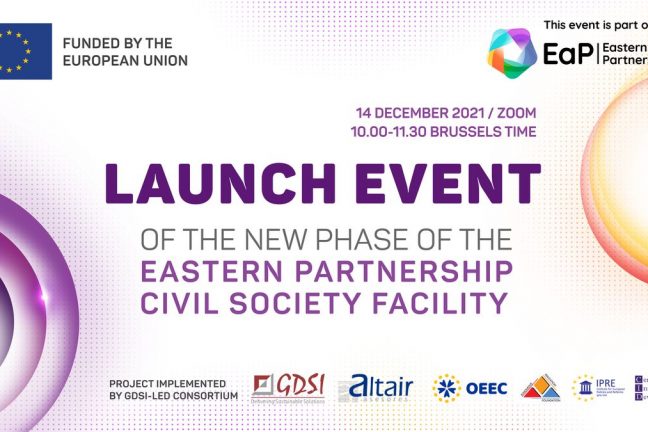
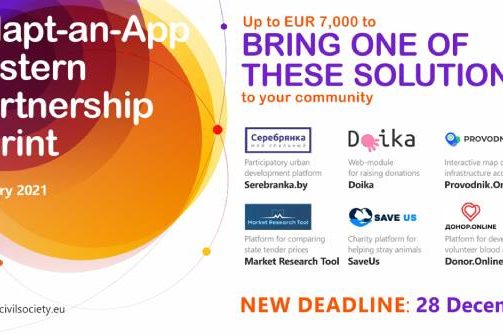
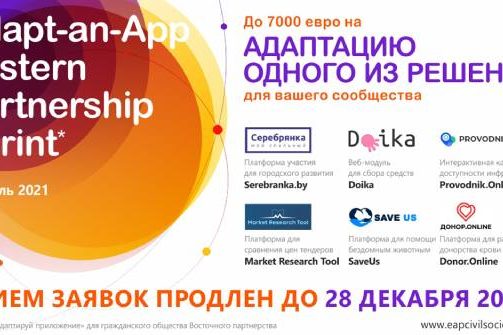
Comment